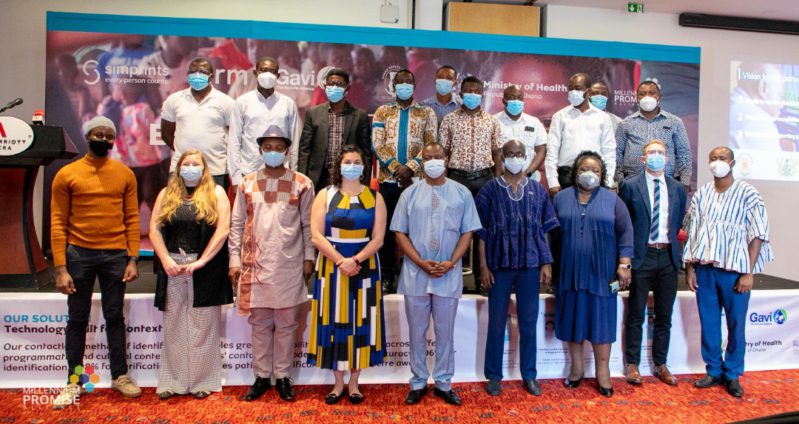The Ghana Health Service (GHS) has partnered with Gavi and Arm to embark on a biometric-based routine immunisation program in the Eastern Region from October 2021.
This is the first national vaccination scheme in the country to use biometrics technology, provided by Simprints.
Simprints is a non-profit technology company committed to transforming the way the world fights poverty.
They build technology to radically increase transparency and effectiveness in global development, making sure that every vaccine, every dollar, every public good reaches the people who need them most.
The Gavi-Arm-Simprints strategic partnership is positioned to provide a unique, privacy-first, digital identification system that will support ongoing maternal and child healthcare programs–inclusive of routine vaccinations–as a function of the Ghana Health Service aim for universal health coverage.
The system does not require an existing formal identification document. It uses a biometric method of identification to safely create a unique ID for each individual, allowing health workers in the field to identify patients accurately, and quickly create or access their healthcare record.
The biometric data is securely collected using the health worker’s Android smartphone, while timestamps and GPS coordinates record the time and location of treatment.
Where internet connectivity is poor or non-existent, offline mode can be used to access a previously downloaded database and new patient data is uploaded when connectivity is restored.
This process is fast, eliminates the need for inefficient paper-based tracking of immunization delivery, and allows patients to be linked to their correct medical record even if they forget or lose their physical ID.
Gavi, the vaccine alliance, guides this program with its immunization expertise to administer vaccines, including for COVID-19.
Vitally, Simprints’ solution focuses on the ethical and inclusive use of digital ID, ensuring it works for diverse populations with solid privacy protocols and patient protection at its core.
The system is compatible with the digital health tools used by healthcare workers, governments, and global development practitioners around the world, and can be rapidly deployed and scaled on low-cost Android devices.
Latest Stories
-
‘Let’s contest on policies, not ballots’ – Veep Opoku-Agyemang urges African leaders at Summit
43 minutes -
National Guard troops appear in Washington DC as mayor rejects ‘authoritarian push’
59 minutes -
Daryl Bosu says helicopter crash must change fight against ‘environmental terrorism’
1 hour -
No printers or PCs, Starbucks Korea tells customers
2 hours -
No white or cream allowed at Davido, Chioma’s Miami wedding
2 hours -
Musk threatens Apple and calls OpenAI boss a liar as feud deepens
2 hours -
M&S restores click and collect services 15 weeks after systems hacked
2 hours -
US deficit grows to $291bn in July despite tariff revenue surge
2 hours -
Judge orders Trump administration to restore part of UCLA’s suspended funding
3 hours -
Newcastle striker Isak still determined to join Liverpool
3 hours -
Liverpool stepping up bid to sign Palace’s Guehi
3 hours -
Newcastle sign defender Thiaw from AC Milan
3 hours -
Alcaraz secures 50th win of 2025 at Cincinnati Open
3 hours -
Everton complete loan deal for Man City’s Grealish
4 hours -
Spurs leave out Bissouma for persistent lateness
4 hours

